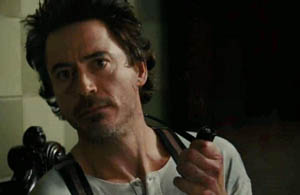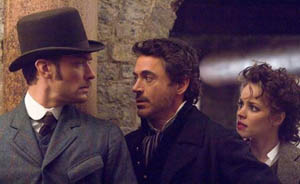|
Guy Ritchie breaks from tradition (his tradition, that is) just a hair with this new take on the classic detective, that hair being basically "it's set in the past." It breaks tradition with the source material by a thicker hair, one designed to either make the film more embraceable by modern audiences, or by he himself, or most likely, both. 
In Victorian England, a practitioner of the black arts, one Lord Blackwood, is tried and sentenced for ritual murder. He promises to return from death, and evidence begins to pile up that he has in fact succeeded. Bullshit, thinks that reknowned debunker of supernatural flummery, Sherlock Holmes. Soon he and Dr. Watson are off chasing the mystery, determined to find Blackwood's secret before he kills again. Holmes' nemesis and potential love interest, Irene Adler, has also come in search of answers of her own, while seemingly manipulated by an unseen figure with his own agenda. The plot is essentially what we expect from Sherlock Holmes; where it both differs and shines is in the characters. Gone is the staid and stately feel of past interpretations; Ritchie's version of the late 1800s is as rainy and gloomy as ever, but vibrant and exciting in ways we don't typically see in filmic portrayals. Holmes himself is something of an incorrigible trouble-seeker; he spends half of the film high (a vice of the literary Holmes usually left out of filmed adaptations) and exhibits much greater physicality, first seen in a bare-knuckled boxing match wherein his lightning-fast thought process, depicted via Ritchie's oft-used time-dialation cutting style, gives him an edge over a larger opponent. His personal life is less slickly managed, as his portion of the flat he shares with Watson is something of a shambles, a modification of Arthur Conan Doyle's character which tips the story away from depicting its protagonist as too perfect in all regards (who ever heard of a fastidious drug addict, anyway?) and shows the price of genius, which is almost inevitably boredom. When not working on a case, Holmes tends to get up to no good, be it testing out drugs on Watson's dog or trying to break Watson himself away from his new love interest. Fans of the modern-day re-imagining of Sherlock Holmes, House, M.D, will recognize instantly the bickering and bantering between the acerbic, committed bachelor and the ladies' man who can't quite ever seal the deal of that series' two leads, a more energetic interpretation of the relationship that keeps the pace high in between the action and clue-sniffing. And perhaps for the first time, London of over a century past looks like a real, large and living city, and not like a cramped backlot. Or even a really expansive backlot. Through the magic of green-screen and some seamless digital painting, we're there. 
It's inevitiably true that the film, like all true-to-form Holmes stories, cheats in its aggrandizement of of its lead: Holmes is a genius in part because he knows things that were invented by his author, who passed that info on to his hero and not to his rivals/allies in the police force. Of course Holmes guesses the involvement of a particular secret society ahead of the audience, because the society doesn't exist outside of the screenplay. However, the film is not so much about legitimate detective work as it is simply about having a fun romp. It's humourous without veering into camp territory and entertainingly dramatic without veering into self-seriousness. It does feel the need, owing to popular perception, to give a certain background character from the mythos more significance than necessary for accuracy-this is an observation, not a complaint; I merely find the evolution of the story model interesting to note. Much of what I find appealing here is Robert Downey Jr's turn as Holmes, creating a character who is likeable on-screen precisely because he'd be infuriating in person. This film isn't, despite its hero's pedigree, a really brainy film, but it is fun to watch, which is all I was expecting or hoping for. -review by Matt Murray P.S. Actually, the film might well be smarter than Arthur Conan Doyle himself, who was famously snookered by a pair of teenaged girls in a way that would have made his creation laugh with much derision.
|
|
||||||||